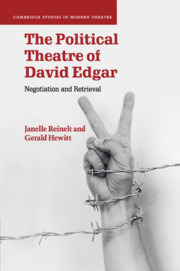6 - Socialism’s aftermath
The Shape of the Table, Pentecost, and The Prisoner’s Dilemma
Published online by Cambridge University Press: 05 August 2011
Summary
The collapse of ‘really existing socialism’ in 1989 caught many political commentators by surprise because it happened so quickly and decisively. Within a year, however, David Edgar had joined fellow playwrights Caryl Churchill, Howard Brenton, and Tariq Ali in exploring the consequences and changing circumstances of those events. Beginning with The Shape of the Table (1990), his closest look at practical negotiation and the transfer of power in a formal political setting, Edgar wrote three plays over the next decade which form a trilogy following the unfolding drama of post-Communist politics. The other two plays, Pentecost and The Prisoner’s Dilemma, were written five and ten years on, respectively, when the politics of immigration and refugees generated deeply divisive fault lines for all of Europe. The former Eastern bloc countries faced extremely difficult problems establishing workable democracies because they were troubled by ultra-nationalism, ethnic conflict, racism, financial instability, and a lack of effective leadership – not to mention external pressures and ‘assistance’ that were often internally perceived as meddling and arrogance on the part of the West. These three plays are Edgar’s most detailed treatment of the problem of democracy itself, and it is no coincidence that in their moment they addressed issues that the West, no less than the former East, was finding increasingly intractable.
There are at least two ways to view Edgar’s preoccupation with this material: first, as a writer and activist on the Left, the end of the cold war and the collapse of the USSR and its eastern and central European (ECE) satellites meant a serious confrontation with the question of what was ‘left of the Left’ in terms of ideology if not programme, historical lessons if not future objectives. Almost overnight ‘socialism’ became identified in the West as a failed project, and conservative scholars and commentators were quick to begin the rhetoric, now only too familiar, of a ‘new world order’ in which capitalism was the triumphant global system and socialism was relegated to the dustbin of history. Probably Francis Fukuyama’s The End of History and the Last Man (1992) is the key touchstone text for the popular conviction that western liberal democracy/capitalism would be universalized as the final form of human government/economy. Thus obviously for a committed writer on the Left, like Edgar, it was important to examine the changes that were underway in order to understand what was happening and also to begin a debate about what price the new democracies would pay for their fledgling arrangements, and what liabilities their communist histories and their years of satellite politics would have for attempts to reconfigure their polities.
- Type
- Chapter
- Information
- The Political Theatre of David EdgarNegotiation and Retrieval, pp. 205 - 264Publisher: Cambridge University PressPrint publication year: 2011

